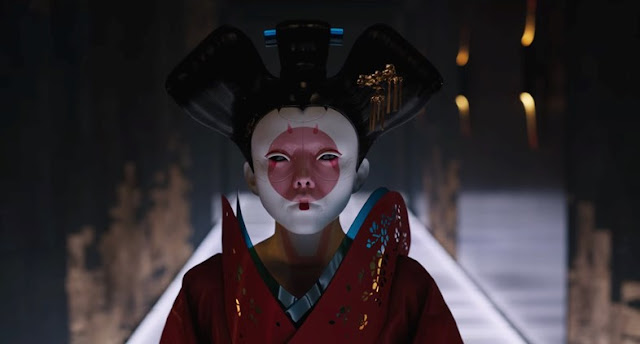Ghost In The Shell: Neon NZ Review
There's an irony that 2017 yields a shiny, yet empty and hollow, new version of Ghost In the Shell, all wrapped up in FX and Weta's wizardry, and coming nearly 30 years after the first iteration of the Manga series appeared.Along with the campaign against the film over its apparent white-washing of its lead, the Asian Major, and a meme meltdown that seized on the film's apparent ignoring of any potential Asian leads, there's already enough for Ghost In The Shell to achieve.
So, it's perhaps frustrating to report that the 2017 version of Ghost In The Shell is pretty hollow, and feels like a missed opportunity, a series of shooter / fighting sequences all wrapped up in some damn near incredible visual and practical work from WETA.
Johansson stars as Major, who's part of an elite group called Section 9, who hunts down terrorists at the government's behest in a futuristic world. But Major is more than just the star operative of this ragtag group, headed up by Beat Takeshi Kitano's Chief. In a world where cybernetic enhancements are becoming the norm, Major's a perfect meshing of a human brain in a robotic body - a precedent for the future.
However, while Major's fairly adept at taking out the bad guys, she begins to experience glitches in her daily life, giving her frightening flashes of a life before... and causing her to question her own identity and loyalties, just as a new terrorist threat emerges...
To be fair to Ghost In The Shell, the themes tackled within are not exactly new and the trope of questioning self and identity are ones which are endemic to most of the genre's films that feature a robot protagonist. (Ridley Scott's Blade Runner being perhaps the chief example of such a film and TV's Westworld being the latest version of the nature of consciousness discussions).
Yet, despite its shiny paint and exquisite visuals for 2017, the new version is very much lacking in anything other than a simple cyberpunk ethos and a videogame aesthetic and narrative. This is not an adaptation of an anime that comes anywhere near close to hitting some of the rich resonance and emotional themes of the originals.
Relatively soulless, and without too many real philosophical edges for the audience to grapple with, this Ghost In The Shell simply chooses to throw out the more thoughtful elements of the series before it, in favour of yet another (admittedly well) choreographed action sequence. It's no Joss Whedon's Dollhouse, that's for sure.
Despite some truly impressive neon-soaked Blade Runner and video game Remember Me-esque cityscape visuals to make up the world, what sits within is, unfortunately, a little less well realised.
While the Geisha-bots that become like scuttling spider-bots are early indications of the visual mastery of Weta's work, their memory soon fades in light of some well-worn familiar style sci-fi dialogue and bullets flying as the emotionally detached film plays out.
Johansson pretty much dials down the emotion and comes off a little like a second-rate action version of her character from Luc Beeson's much-overlooked flick Lucy. She brings some edges to some of the emotional conflict that arises from within, but she never quite fully sells the struggle with her past. And Snow White and The Huntsman director Sanders reaches Michael Bay levels of fetishization of Johansson's form within the suit and when she's lying on a bed as he brings the story-boards to life...
(And it has to be said, unfortunately, that some of the white-washer naysayers have a point, particularly when Major's past is addressed towards the film's denouement. There's also a whole debate over the rest of the casting of the film as well, with many of the Asians represented on screen playing more sub-serviant roles than anything substantially meaty.)
Pilou Asbaek's second-in-command is a thankless role that ploughs the action into the brawn and little else; Kitano's support is equally solid as well, but he's relegated to the sage overlord dispatching ideas and checking up on his team, rather than anything more. Elsewhere, Juliette Binoche brings the humanity in her doctor, but again, it's scant anything other than brief broad brush strokes to satisfy the most brain-dead of audience members.
It helps little that Ghost In The Shell's emotional edges are lacking and the pay-offs not as spectacular as the stakes in the final act. It's something that's little supported in the film's scripting and filters through the entire film; and while the action sequences are dispatched tautly and effectively, they're all emotionless, formulaic sequences that barely stay in the memory long after the conclusion of the film.
Ultimately, Ghost In The Shell's extraordinary visuals shine way above anything else on the screen.
It's a clear case of style over substance, which is no bad thing given the level of detail spent on them.
Referencing The Matrix, Blade Runner and many Arthur C Clarke tropes, the film's eye-wateringly gorgeous FX and confidently realised world crackle where the rest of the film unfortunately does not.
In the final wash, Ghost In The Shell's weaker narrative, combined with its sidelining of the more interesting philosophical debates and the story of identity of its main protagonist, sadly stop it from becoming a true sci-fi classic, leaving it floundering as a hollow and shallow video-game lite experience that's more about what's on screen than what lies beneath.






%20&%20Edith%20Poor%20(Lizzie%20Moyle)_%C2%A9BBCS%20&%20Bunya%20Entertainment.jpg)
No comments:
Post a Comment